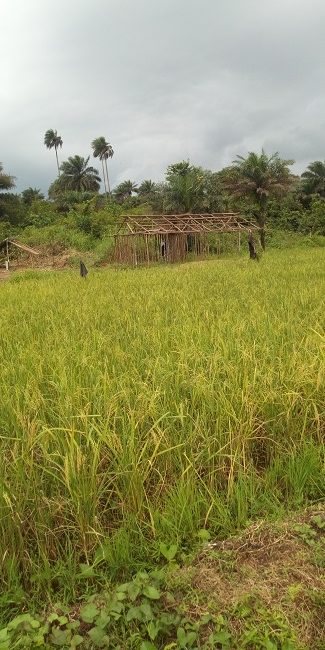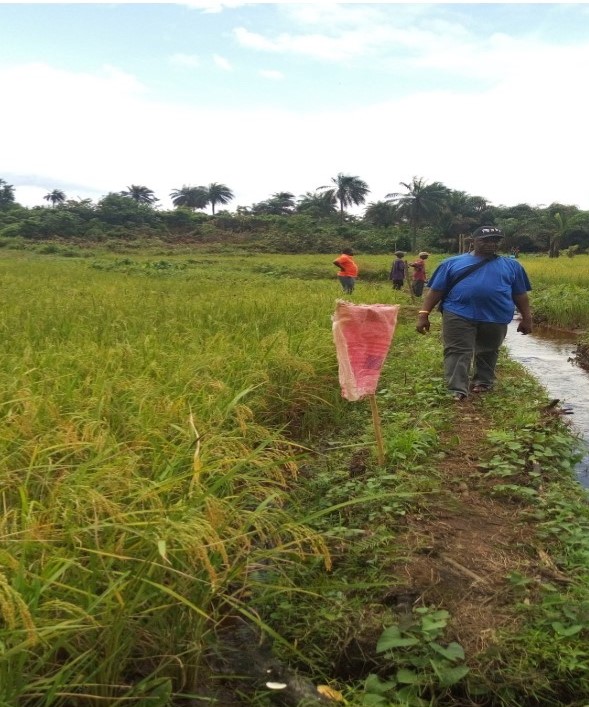-Urges compatriots to prioritize urban Farming as business
By Edwin M. Fayia, III
A prominent practicing Liberian Accountant has for some time now been engaged in serious peri-urban agricultural activities in swamp rice cultivation at Moulton Corner Community in the settlement of Brewerville outside Monrovia.
The UN Food and Agriculture Organization defines peri-urban agriculture as “agriculture practices within and around cities which compete for resources (land, water, energy, labour) that could also serve other purposes to satisfy the requirements of the urban population.”

Accountant Alexander Tamba Molley Siafa, a resident of Freetown Community in Brewerville, told www.newspublictrust.com that swamp rice development initiative is intended to remain and prove to Liberians and support partners that rice can grow anywhere in Liberia.

He intimated that the current swamp rice cultivation is being carried out to also remind Liberians and partners that the soil is the most reliable bank that stimulates the Liberian economy now and the future.
Mr. Siafa, also a development and planning specialist, argued that many countries globally are stable economically and peaceful security wise as a result of citizens and support partners engaging into serious agricultural initiatives.
There are many undeveloped swamps and other vital areas in Monrovia and its environs and peri-urban farmers are not developing same in order to help improve their socioeconomic conditions, Mr. Siafa noted.
The Liberian Accountant expressed serious concern about the staggering amount spent on the importation of the nation’s staple food, rice in the neighbourhood of over US$200 million every year.
Such enormous amount could be diverted to critical infrastructure development initiatives such as the construction of durable roads, schools, hospitals and better housing facilities for Liberians.
Besides, Mr. Siafa stressed that it is indeed regrettable on many occasions Liberians are seen in long lines to buy imported rice and truck loads of imported heading for the one time massive food production belts of Lofa, Nimba, Bong and Grand Gedeh Counties.
On a very serious note, the current Liberian Government must wake up from its endless slumber and embark on an extensive crusade of mobilizing Liberians and support partners for the engagement of agricultural activities throughout the country.
In addition, Mr. Siafa stressed that the enabling environment should be provided and established where both rural and urban farmers will able to sell their harvested cash crops and other non-perishable commodities throughout the country.
He further cautioned the Liberian Government in particular and Liberians in general that peri-urban agriculture is one of the ways to motivate rural farmers to consider agriculture and its related endeavours as a sustainable economic enterprise in the country.
Mr. Siafa specifically underscored the need for the United Nations Food and Agriculture Organization (FAO) to revise and reactivate its peri-urban agriculture initiative that during the crisis period in Liberia helped many local Nongovernmental Organizations to achieve some minimum food security.
The Liberian planning specialist also suggested that agriculture should be treated and considered as business in every shape, form and manner in order for farmers and some of the peri-urban farmers will be able to generate resources that will in turn their social and economic conditions in Liberia.
“Peri-urban farmers should encouraged in the provision of substantial swamp lands in several urban areas to carry out the cultivation of swamp rice and related cash crops such as variety of vegetables and other non-perishable commodities in the country,” Mr. Siafa added.
“Provision of tools such power tillers, shovels, hoes and diggers, cutlasses and chemicals will indeed enhance the production capacity of peri-urban farmers in many urban cities in our country,” Mr. Siafa emphasized.
“I want admonish Liberians across our country to encourage our support partners to concentrate most of our energies to initiate the development of our swamp rice production in order to beat back huge importation of rice in our commerce and trade,” Mr. Siafa stressed.

